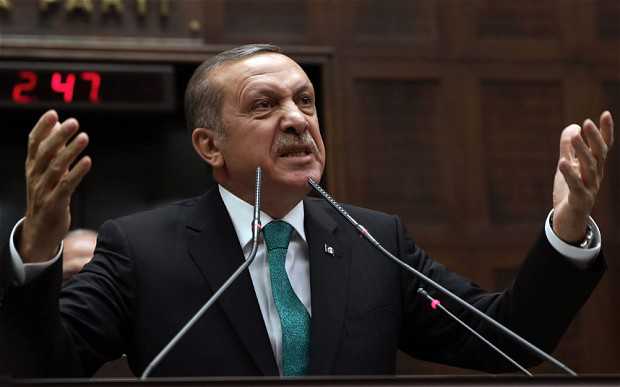Raids against opposition journalists, ex-police chiefs and investigators highlight how far president has distanced Turkey from west
In response to a critical statement from Brussels about Turkey’s joining the EU, Recep Tayyip Erdogan said: ‘Please keep your wisdom to yourself.’ Photograph: Kayhan Ozer/AP
Recep Tayyip Erdoğan’s politics of paranoia has taken another ugly twist with the arrest of more than 30 opposition journalists, media workers, former police chiefs and investigators on palpably flimsy conspiracy charges. The Turkish president’s latest coup – nobody in Istanbul doubts he personally ordered the nationwide raids – highlights a bigger, awkward question for the EU and the US: can Turkey under Erdoğan any longer be deemed a reliable, democratic western ally?
The weekend raids targeted Zaman newspaper, whose editor-in-chief, Ekrem Dumanli, was among those detained, and other media outlets allegedly engaged in “forgery and slander”. Fierce condemnation quickly followed. Opposition leader Kemal Kılıçdaroğlu called them “a coup against democracy”. The US said judicial independence and due process were at risk. Erdoğan must take care “not [to] violate these core values and Turkey’s own democratic foundations,” it said.
A critical statement from Brussels underscored long-held concerns that Erdoğan and his neo-Islamist Justice and Development party (AKP) are no longer serious about joining the EU. “This operation goes against European values and standards Turkey aspires to be part of,” it said.
Erdoğan’s acerbic response on Monday suggested the EU’s concerns were justified. His enemies had launched “dirty operations” against him, so deserved what they got. “They cry press freedom, but (the raids) have nothing to do with it. We have no concern about what the EU might say, whether the EU accepts us as members or not, we have no such concern. Please keep your wisdom to yourself,” he said.
Crowds supporting the Zaman journalists held banners outside the newspaper’s offices saying “The free press cannot be silenced”. But that is not wholly true. Erdoğan, elected president this year after three consecutive terms as prime minister dating back to 2003, exercises de facto control over most of Turkey’s mainstream media, as well as parliament, the courts and the security services.
His intimidation and suppression of independent journalism, and his zero tolerance for criticism from whatever quarter, are notorious. During the Gezi street protests in 2013, which were brutally repressed, he railed against Twitter and other social media and briefly tried to ban them. Turkey’s human rights record, especially its unequal treatment of its Kurdish minority, is a stain on the country’s reputation, as a recent Human Rights Watch report made clear.
A focus of Erdoğan’s ire is corruption allegations that surfaced a year ago this month, implicating his associates, government ministers and their families. The president blamed a conspiracy allegedly masterminded by Fetullah Gülen, an influential former ally and fellow devotee of Islam now exiled in the US, and claimed he was the victim of a coup attempt. Corruption is a serious problem in Turkey, according to Transparency International. But last year’s investigation has now been dropped, its protagonists punished or sacked.
Erdoğan has levelled similar accusations in the past at the Turkish armed forces (which have a history of coup-making), and has mounted large-scale purges and mass trials. Ahmet Davutoğlu, Erdoğan’s prime minister, described the latest arrests as an “examination” of loyalty to the Turkish republic. “This is a day of tests. We are trying to protect democracy and everyone will get his share of the bill or reward due to their stances,” he said.
In truth, Erdoğan was imposing a test of loyalty to himself, critics replied. “What examination?” asked columnist Yusuf Kanli. “Those who align with ‘democracy’ or engage in an allegiance relationship with the government would be rewarded, while those who exercise the fundamental right to criticise, that is, oppose the government in any manner, would be severely punished. Can this mentality be reconciled with the notion of democracy?”
Erdoğan was ignoring the politically impartial, non-executive presidential role prescribed by the Turkish constitution and was instead accumulating ever greater powers – and nobody appeared able to stop him, said Hurriyet newspaper’s Nuray Mert. “The prime minister seems to be his assistant … [Erdoğan] behaves like a supreme leader.”
Comparisons between Erdoğan’s paranoid authoritarianism and Russia’s similarly insecure, home-grown autocrat, Vladimir Putin, are now commonplace. And they are matched by shifts in Turkey’s geopolitical orientation, symbolised by a new gas supply deal with Moscow coinciding with the cancellation of Russia’s South Stream gas project with the EU. At a recent summit Putin and Erdoğan pledged to treble bilateral trade by 2020.
At the same time, Erdoğan continues to indulge in fierce anti-western rhetoric, and to withhold full cooperation with the US and British air campaign against Islamic State (Isis) in Iraq and Syria – despite Turkey’s Nato treaty obligations. Turkey also refused to reinforce beleaguered Kurdish forces fighting Isis around Kobani.
Visiting Ankara last week, David Cameron asked for better cooperation in stopping foreign jihadis, including Britons, from travelling through Turkey to Syria. What Cameron got, in public at least, was a lecture from Davutoğlu on the west’s responsibilities. Nor did the British prime minister raise human rights or media freedom during talks with Erdoğan, according to those who travelled with him.
Cameron’s reluctance to confront his host, while shaming, was a good indication of his own priorities – and of how little leverage Britain (and the EU) has these days in Ankara. It showed how far the Erdoğan supremacy has distanced Turkey from the western democracies.

